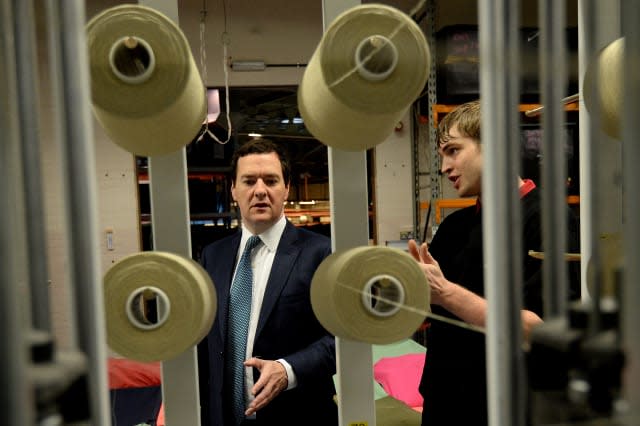New stats show UK 'fastest growing major economy'

Britain's economy grew by 2.6% in 2014 but the pace of expansion slowed more sharply than expected in the last three months of the year, official figures showed today.
The annual figure is the best since 2007, before the recession, and indicates that the UK is likely to have been the world's fastest growing major economy last year.
But gross domestic product (GDP) rose by just 0.5% in the fourth quarter, the weakest level in a year, weighed down by a construction sector which shrunk at its worst pace for more than two years.
The growth figure for 2014 was widely expected, though falls short of the 3% forecast last month by the independent Office for Budget Responsibility (OBR).
It beats 2013's figure of 1.7% and matches the 2.6% recorded in 2007.
US growth figures are due to be published on Friday. The International Monetary Fund (IMF) estimates its growth at 2.4%.
UK GDP is now 3.4% higher than the pre-recession peak at the start of 2008, according to the ONS.
Chancellor George Osborne said: "Today's figures confirm that the recovery is on track and our plan is protecting Britain from the economic storm, with the fastest growth of any major economy in 2014.
"But the international climate is getting worse, and with 100 days to go until the election now is not the time to abandon that plan and return Britain to economic chaos."
Quarterly growth of 0.5% has not been slower since the fourth quarter of 2013 when it was 0.4%. Economists had expected it at 0.6%.
The disappointment is likely to further push back the likely timing of an interest rate rise, amid ultra-low inflation.
Growth was dragged down by construction, which contracted by 1.8% - its worst slowdown since the second quarter of 2012.
Manufacturing grew by just 0.1%, its worst performance since the start of 2013. The wider production sector shrank by 0.1%.
The dominant services sector, which represents more than three quarters of output, grew by 0.8%.
Services are now 7.9% ahead of their pre-downturn level at the start of 2008 but manufacturing remains 5.4% behind while construction is lagging by 7.9%.
ONS chief economist Joe Grice said: "This is the second consecutive quarter in which the growth rate has fallen but it is too early to say if there is a general slowing-down of the economy.
"The dominant services sector remains buoyant while the contraction has taken place in industries like construction, mining and energy supply, which can be erratic."
The quarterly growth of 0.5% follows expansion of 0.7% in the third quarter and 0.8% in the second quarter.
Samuel Tombs of consultancy Capital Economics said the sharp fall in the oil price, expected to provide a boost in spending, should help the UK "regain some vigour in early 2015" following the slowdown.
He added that the figures showed "that the recovery has narrowed to become almost entirely dependent on growth in services sector output" with industrial production and construction down.
"Nonetheless, with the recent halving of oil prices providing a timely boost to households' discretionary spending power, credit still becoming cheaper and pay growth on an improving trend, we think that GDP growth could pick up to 3% this year.
"In short, the best days of the UK's recovery may still lie ahead."
James Knightley of ING Bank said: "This is the eighth consecutive quarterly expansion, but is disappointing, hinting at a loss of momentum.
"The details show that the long heralded rebalancing story in the UK has completely stalled."
Chris Williamson, chief economist at Markit, said the "favourable environment of rising wages, low inflation and low interest rates" should see another year of solid growth in 2015.
But he added: "Until exports pick up, growth is looking unbalanced, and once again all-too dependent upon the consumer."
Mr Williamson also pointed to key risks including the impact of the election of anti-austerity party Syriza in Greece, and the uncertainty ahead of the UK's own election in May.

Economic stories on AOL Money
Why our ageing population needs immigration
Surprise as UK trade gap widens
Economic growth revised upwards



